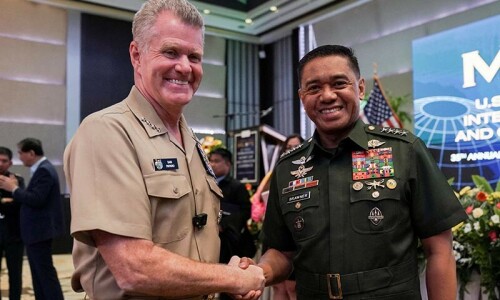BEIJING: China and the Philippines accused each other on Saturday of deliberately ramming their coast guard ships near a flashpoint shoal in the South China Sea, the latest in a spate of similar incidents in recent weeks.
A Chinese coast guard spokesperson said the Saturday incident took place off the disputed Sabina Shoal, which has emerged as a new hotspot in the long-running maritime confrontations between Manila and Beijing.
Shortly after noon, a Philippine ship “deliberately collided with” a Chinese vessel near the shoal, known in Chinese as Xianbin, China Coast Guard spokesperson Liu Dejun said, according to state broadcaster CCTV.
“China exercises indisputable sovereignty” in this zone, Liu said, condemning the “unprofessional and dangerous” conduct of the Philippine vessel.
However, Philippine Coast Guard spokesman Jay Tarriela said it was the China Coast Guard vessel 5205 that “directly and intentionally rammed” the Philippines’ 97-metre ship, BRP Teresa Magbanua.
The vessel has been anchored inside Sabina Shoal since April to assert Manila’s claim over the area.
Tarriela said the ramming happened three times, hitting the BRP Teresa Magbanua’s port bow, starboard quarter and port beam.
No crew members were injured during the incident but the ship’s bridge wing and freeboard were damaged. A hole was also found.
“It is important for us to take note that this ramming happened despite…our unprovoked action and presence in Escoda Shoal,” Tarriela told reporters, using the Filipino name for Sabina Shoal.
‘Serious concern’
The collision was the fifth such incident this month, Tarriela said.
National Maritime Council spokesperson Alexander Lopez said a report about the latest clash would be sent to the Philippine Department of Foreign Affairs for review and appropriate action.
“We take this with serious concern,” Lopez told a news conference.
“We are there on a legal basis because that is ours, we don’t need to ask for permission in our own territory. Let us be very clear about it,” he said.
Philippine and Chinese vessels have collided near Sabina Shoal at least twice this month and analysts say Beijing is trying to move deeper into Manila’s exclusive economic zone and normalise Chinese control of the area.
The discovery this year of piles of crushed coral at the shoal ignited suspicion in Manila that Beijing was planning to build another permanent base there, which would be its closest outpost to the Philippine archipelago.
Recent clashes between Philippine and Chinese vessels have also taken place around Second Thomas Shoal in the Spratly Islands.
A Filipino sailor lost a thumb in a clash there in June when Chinese coast guard members wielding knives, sticks and an axe foiled a Philippine Navy attempt to resupply a small garrison.
Sabina Shoal is also the rendezvous point for Philippine resupply missions to the garrison on Second Thomas Shoal. Sabina Shoal is located 140km west of the Philippine island of Palawan and about 1,200km from Hainan island, the nearest major Chinese landmass.
Published in Dawn, September 1st, 2024













































Dear visitor, the comments section is undergoing an overhaul and will return soon.